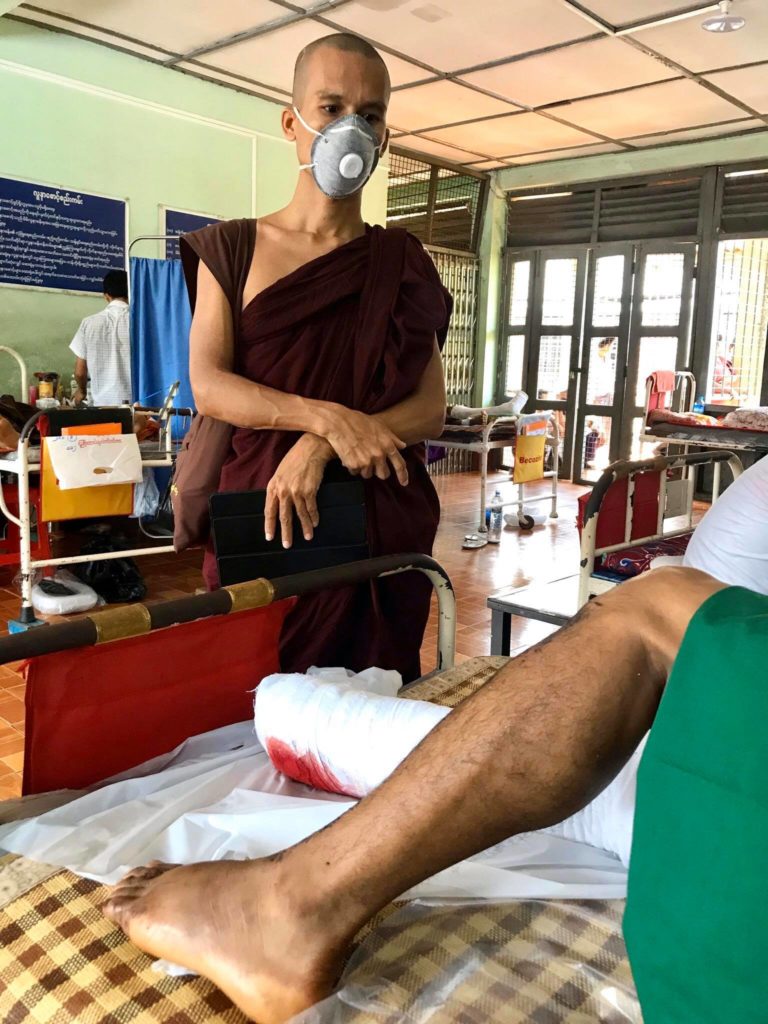It’s time to fight for justice for landmine victims
May 11, 2020
HURFOM: In Kyaung Shar Kwin Area, Yebyu Township, Tenasserim Division, innocent civilians are suffering from landmine explosions. Some have lost their legs and at least one person has died.
Most recently, in the early afternoon of May 4, a 37-year-old plantation worker stepped on a landmine. The blast took his right foot. Since late 2018, there have been at least 10 landmine explosions resulting in fatalities and serious injuries in Yebyu Township. Half of the incidents have taken place in the Kyaung Shar Kwin area.
Mon Activist, Monk Ashin Ott Ja (also known as/aka) U Zin Zaw Latt, said it is time to fight for justice for landmine victims.
“The landmine problem is not a personal problem. Now, 10 people were injured by landmines. Within 2 years, 8 or 9 people have lost their legs. Among them, there was only one soldier. The rest were innocent civilians. The international community doesn’t accept using landmines. We, Mon people, also don’t accept landmines. As we showed our strength at the “Blue Kyune (Chaung Zone) Bridge Demonstration”, we must organize a national level protest. We must find justice,” said U Zin Zaw Latt.

Kyaung Shar Kwin Area is at the border of Mon State and Tenasserim Division. Most of the inhabitants are Mon people. Both New Mon State Party (NMSP) and the Karen National Union (KNU) are active in the region. Armed clashes and landmine explosions are commonplace.
“First, we should organize protests to reveal who is responsible for the use of landmines. Landmine explosions don’t happen in war zones. Landmine explosions occur in places where people live. We must force the government to find a solution and ensure accountability. Whoever or which ethnicity was attacked by landmine, the most responsible body is the union government. Secondly, the State government, the Mon and Karen army and the Burmese military must find a solution together,” said the Monk.
In 2020, one person died due to a landmine explosion while three individuals have lost their legs.
Suspicion of who is responsible is palpable in the communities affected.
“We can’t say for certain which organization set up the landmine. We didn’t see with our naked eyes. But it’s sure that the landmine burst didn’t happen in NMSP territory but in KNU territory,” said one Myauk Chaw resident.
While there is agreement with the Mon Activist, Monk Ashin Ott Ja call, for a national level protest, some residents are not hesitant to locate accountability.
“It happened in Tenasserim Division but it is also related to Mon (State) CSO’s and CBO’s. I think Mon CSO’s are weak in fighting against landmines. I think we should organize a national level protest and demand justice,” said Rehmonnya Eam Chai, a Ye resident.
Even though it is not known which organizations are responsible for these landmines, both the NMSP and the KNU must be accountable for regional stability, stated the Dawei District NMSP on March 16, 2020. The statement said both parties would try their best to find a solution.
Such statements are not reducing residents’ frustration with the situation.
“The KNU and the NMSP discussed [the issue of] landmines explosions but [the discussion was not] effective. Landmines continued to explode while they were discussing the topic, so it looks like both parties do not respect the issue they were discussing. Normally, problems must be solved after the discussion. But in reality, it isn’t like that, so I think they don’t value the people who are suffering the impacts of landmine. Without a concrete plan the landmine problem is going to get bigger.” said a Myauk Chaw resident.
Residents seek solutions to allow their livelihoods
Kyaung Shar Kwin residents had met with the KNU and demanded they officially acknowledge farmland and plantations in their territory. The KNU was asked to allow hillside plantations where villagers work leveling the ground and clearing bushes. In addition, residents want to be able to do paddy farming. The KNU has allowed other types of farming and irrigation systems, by extending “Land Use/Ownership Certificates” to villagers.
However the KNU has also denied some “Land Use/Ownership Certificates” cases arguing that such rest requests must be reported to the upper authorities. According to a Myauk Chaw resident, in these cases the KNU said “they would try to get a true and just solution within a week.”
There are about 20 Mon residents who work on plantations in KNU controlled areas in the Kyaung Shar Kwin region and there are about 2,000 acres of plantation. Mon residents bought their plantation in accordance with the “Customary Land Tenure” process and even though they do not have “Land Use/Ownership Certificates” approved by KNU, they still have to pay taxes to KNU, according to the villagers.
Comments
Got something to say?
You must be logged in to post a comment.



















































